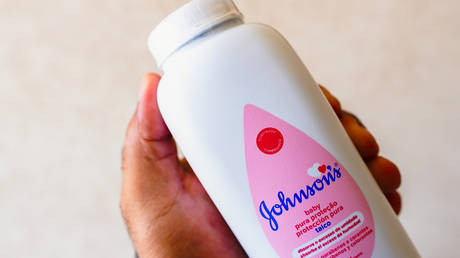
The drug company will offer $8.9bn over 25 years to resolve lawsuits from tens of thousands of alleged victims of its baby powder
Drug giant Johnson & Johnson has agreed to pay $8.9 billion to settle claims that its talc-based baby powders caused cancer – a record-setting sum that would nevertheless avoid admitting culpability in tens of thousands of cases.
The company has not “changed its longstanding position that its talcum powder products are safe,” J&J said in a statement on Tuesday. The settlement is merely meant to “resolve all the current and future talc claims” in a “timely manner,” it said.
The money will be paid over 25 years via a subsidiary, LTL Management, which has filed for Chapter 11 bankruptcy in order to pay for the settlement. J&J’s previous efforts to set up LTL as a liability shield to absorb the losses from ongoing talc lawsuits were rejected in court on Friday.
The offer satisfied attorneys for about 70,000 plaintiffs, with lawyer Mikal Watts of Watts Guerra LLC describing it as “the culmination of a job well done” and arguing the payout would “get our clients fairly paid for their injuries.”
However, lawyers for tens of thousands more plaintiffs rejected the sum. Attorneys with Beasley Allen accused J&J of “seeking an extremely deep discount on justice,” calling the proposed payout “woefully inadequate to cover even the current ovarian cancer and mesothelioma claims, much less any future claims.”
“This sham deal does not even pay for most victims’ medical bills,” attorney Jason Itkin of Arnold & Itkin said in a statement on Tuesday.
Any settlement out of bankruptcy would require the approval of both a bankruptcy court judge and 75% of the plaintiffs. J&J’s offer would be the largest post-bankruptcy product liability settlement on record.
J&J stopped selling its talc-based baby powder internationally only just last year, despite the US Food and Drug Administration finding a “potential for contamination of talc with asbestos” – a notorious carcinogen. The agency also found “a possible association between the use of powders containing talc in the genital area and the incidence of ovarian cancer.”
The company already lost nine cases related to its talc products of the 41 that have gone to trial. One high-profile case resulted in a $4.7 billion judgment against J&J, though they were able to reduce the sum to $2.1 billion on appeal and have vowed to take it all the way to the Supreme Court in an effort to have it reversed. It has won, mistrialed, or successfully appealed 32 cases.




